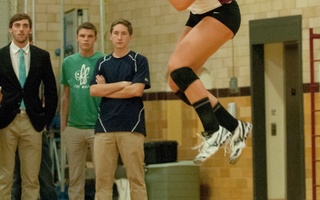{shortcode-bd7623f69905af395c9c21e895d4624e3f230568}
Matchups with Ivy League opponents often define the Harvard athletics experience. The Harvard-Yale football game is a tradition that dates back to 1897, and it’s a contest that is often the definitive moment in the Crimson’s season, especially for fans. It is perhaps Harvard’s most important and well-known sporting event along with possibly the Head of the Charles regatta.
Given all of the tradition and rivalry amongst the members of the Ancient Eight, competition against non-league opponents can often be overlooked, becoming footnotes in schedules headlined by matchups with fellow Ivy League schools.
For the football team, the non-conference games that head coach Tim Murphy schedules all have a specific purpose. Since most games against non-league opponents are played earlier in the year than games against other Ivy teams, Murphy seeks to build some winning momentum before challenging games against teams like Dartmouth and Penn.
“I think because you tend to play your out-of-league games early in the season, it makes sense that you would want to develop some confidence,” Murphy said.
Although the schedule seems to intensify as the season progresses, the Ivy League matchups early in the year are not as easy for the team as they may appear.
“We’ve had a great run against Brown, but they’ve actually been probably the third winningest team in our league over the past 15 years,” Murphy said. “People think Cornell is an easy game, and going into the 1997 season...Cornell had beaten us 12 straight years. It’s all a matter of context. None of those games seem easy.”
Aside from scheduling these few contests based on level of competition, there are a handful of other factors that go into Coach Murphy’s decision-making process.
Schools with good recruiting bases and alumni bases are important to have on the schedule for the Crimson. The University of San Diego and Georgetown are just two examples of schools Harvard has faced in recent years that fit that profile, and strong academic Division I schools are also important in Murphy’s scheduling efforts.
Regardless of the teams that end up on Harvard’s schedule in any given year, the team’s philosophy remains the same for non-conference games as it is for the yearly Ivy League matchups.
“Our mindset is that we can beat anyone on our schedule,” Murphy said.
Football is one of the more popular sports on campus in terms of fan interest and viewership, but golf is a sport with a smaller following that has a schedule that can be just as interesting. Since the men’s and women’s golf teams participate in tournaments rather than individual matchups with other schools, the Crimson’s league and non-league competition often compete at the same events.
According to men’s and women’s golf coach Kevin Rhoads, the two major factors in deciding what events the teams will participate are the level of competition and playing in tournaments where there is optimal weather in late fall and early spring.
“It’s usually based on time of year when we need to augment our tournament schedule and find the best weather that we possibly can,” Rhoads said. “Nearing the end of the fall and early in the spring, we tend to be out of region for one tournament on each [team].”
On Sept. 12, the women’s team traveled to Finkbine Golf Course in Iowa for the Diane Thomason Invitational, in which the Crimson placed fourth out of 12 teams. The tournament included non-conference opponents from as close as Boston University to as far away as South Dakota State, North Florida, and Wichita State.
Read more in Sports
Three Things to Watch: Harvard-UMassRecommended Articles
-
Trial Demonstrators Burn California BankDemonstrators in Santa Barbara. California, set fire to a bank as violence continued in the city for the second consecutive
-
Mixed Results So Far on West Coast TripTwo of Harvard’s losses came at the hands of ranked teams and the third stemmed from a one-goal defeat, facts that provided the Crimson with many lessons.
-
 Crimson Lacks Scoring Touch Against West Coast Opponents
Crimson Lacks Scoring Touch Against West Coast Opponents -
Men's Water Polo Journeys West, Wins Three of Five Against Top CompetitionLess than a week after a third place showing at the Ivy League Championships, the Harvard men’s water polo team headed west and produced three wins against Californian competitors at Santa Clara University’s Rodeo Tournament.
-
 Women's Volleyball Wins Two, Falls to Delaware
Women's Volleyball Wins Two, Falls to Delaware













